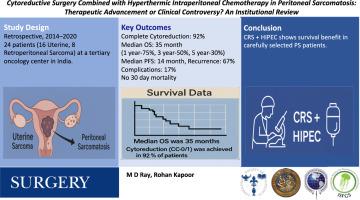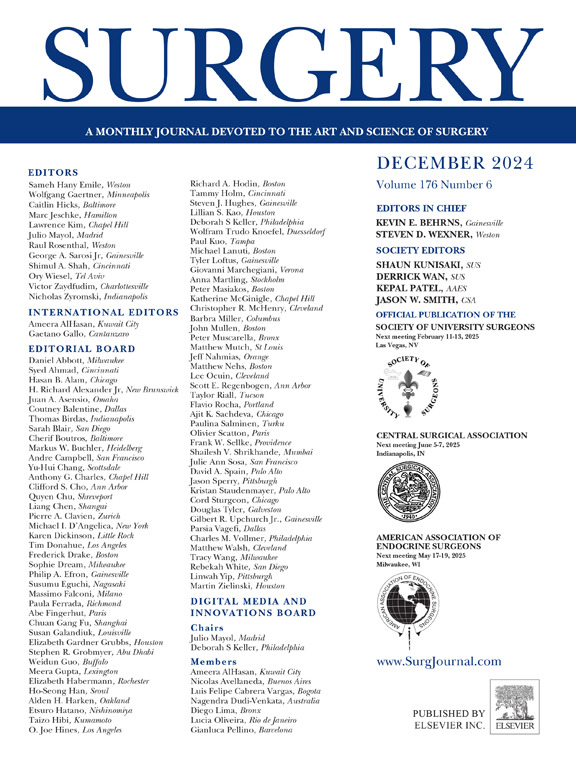Cytoreductive surgery combined with hyperthermic intraperitoneal chemotherapy in peritoneal sarcomatosis: Therapeutic advancement or clinical controversy? An institutional review
IF 2.7
2区 医学
Q1 SURGERY
引用次数: 0
Abstract
Background
Peritoneal sarcomatosis is a rare and aggressive condition with limited treatment options. Cytoreductive surgery combined with hyperthermic intraperitoneal chemotherapy has been explored as a potential therapeutic strategy, although its efficacy remains uncertain.
Methods
We conducted a retrospective analysis of 24 patients with peritoneal sarcomatosis secondary to uterine and retroperitoneal sarcomas treated at a tertiary oncology center in India between 2014 and 2020. Eligible patients underwent cytoreductive surgery combined with hyperthermic intraperitoneal chemotherapy, with follow-up extending for at least 5 years. Outcomes assessed included completeness of cytoreduction (CC-0/1), perioperative morbidity, overall survival, and progression-free survival.
Results
The cohort comprised patients with 16 uterine sarcoma and 8 patients with retroperitoneal sarcoma. Complete cytoreduction (CC-0/1) was achieved in 92% of cases. The median overall survival was 35 months (uterine: 32 months; retroperitoneal: 38 months), with 1-, 3-, and 5-year survival rates of 75%, 50%, and 30%, respectively. The median progression-free survival was 14 months, with a recurrence rate of 67%. Postoperative complications occurred in 17%, with no 30-day mortality.
Conclusion
Cytoreductive surgery with hyperthermic intraperitoneal chemotherapy offers a potential survival benefit for select patients with peritoneal sarcomatosis, particularly those with complete cytoreduction. Although recurrence rates remain high, this approach may improve outcomes compared with systemic therapy alone. Further prospective studies are needed to refine patient selection and optimize treatment strategies.

细胞减少手术联合腹腔热化疗治疗腹膜肉瘤:治疗进展还是临床争议?机构审查
腹膜肉瘤病是一种罕见的侵袭性疾病,治疗方案有限。细胞减少手术联合腹腔热化疗作为一种潜在的治疗策略已被探索,尽管其疗效仍不确定。方法回顾性分析2014年至2020年在印度某三级肿瘤中心治疗的24例继发于子宫和腹膜后肉瘤的腹膜肉瘤病。符合条件的患者接受细胞减少手术联合腹腔内高温化疗,随访至少5年。评估的结果包括细胞减少的完整性(CC-0/1)、围手术期发病率、总生存期和无进展生存期。结果本组16例子宫肉瘤患者和8例腹膜后肉瘤患者。92%的病例实现了完全的细胞减少(CC-0/1)。中位总生存期为35个月(子宫:32个月;腹膜后:38个月),1、3、5年生存率分别为75%、50%和30%。中位无进展生存期为14个月,复发率为67%。术后并发症发生率为17%,无30天死亡率。结论:对于腹膜肉瘤患者,特别是那些细胞完全减少的患者,细胞减少手术联合腹腔内高温化疗可提供潜在的生存益处。虽然复发率仍然很高,但与单独全身治疗相比,这种方法可以改善结果。需要进一步的前瞻性研究来完善患者选择和优化治疗策略。
本文章由计算机程序翻译,如有差异,请以英文原文为准。
求助全文
约1分钟内获得全文
求助全文
来源期刊

Surgery
医学-外科
CiteScore
5.40
自引率
5.30%
发文量
687
审稿时长
64 days
期刊介绍:
For 66 years, Surgery has published practical, authoritative information about procedures, clinical advances, and major trends shaping general surgery. Each issue features original scientific contributions and clinical reports. Peer-reviewed articles cover topics in oncology, trauma, gastrointestinal, vascular, and transplantation surgery. The journal also publishes papers from the meetings of its sponsoring societies, the Society of University Surgeons, the Central Surgical Association, and the American Association of Endocrine Surgeons.
 求助内容:
求助内容: 应助结果提醒方式:
应助结果提醒方式:


